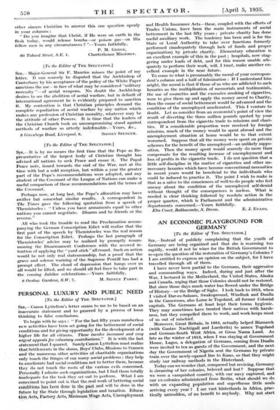PERSONAL LUXURY AND PUBLIC NEED [To the Editor of THE
SPECTATOR.]
Sin,—Canon Lyttelton's letter seems to me to be based on an inaccurate statement and to proceed by a process of loose thinking to false conclusions.
To begin with he says : For the last fifty years numberless new activities have been set going for the betterment of social conditions and for giving opportunity for the development of a higher life for all citizens. These involve incessant and very urgent appeals for voluntary contributions." It is with the last statement that I quarrel. Surely Canon Lyttelton must realize that Settlements in the slums, Boys' Clubs, Missions to Feamen and the numerous other. activities of charitable organizations only touch the fringes of ow many social problems ; they help to ameliorate bad social conditions not to better them, because they do not touch the roots of the various evils concerned. Personally I admire such organizations, but I find them totally inadequate for the task they set out to perform. What I am concerned to point out is that the real work of bettering social conditions has been done in the past and will be done in the future by the State through legislation and taxation. Educa- tion.Acts, Factory Acts, Minimum Wage Acts, Unemployment and Health Insurance Acts—these, coupled with the efforts of Trades Unions, have been the main instruments of social betterment in the last fifty years ; private charity has done useful auxiliary work. The tendency has been. and is for the State or Local Authority to take over functions formerly performed (inadequately, through lack of funds and proper organization) by private charity. Elementary education is an excellent example of this in the past ; hospitals, now stag- gering under loads of debt, and for this reason unable ade- quately to perform their work, will, I trust, make another ex- cellent example in the near future.
To come to what is presumably the moral of your correspon- dent's column and a half of fulmination : If I understand him aright, the moral is that if those of us who are addicted to such luxuries as the multiplication of memorials and testimonials, the use of cosmetics and the excessive smoking of cigarettes, were to give them up and apply the money saved to Charity, then the cause of social betterment would be advanced and the condition of the unemployed ameliorated. This I venture to doubt. Let us consider from an economist's point of view the result of diverting the three million pounds quoted by your correspondent from the cigarette trade to missions and chari- ties. If a considerable proportion were received by foreign missions, much of the money would be spent abroad and the unemployment situation at home would be to that extent worsened. Suppose that all the money were spent on private schemes for the benefit of the unemployed—an unlikely suppo- sition. Then the money spent would scarcely do more than compensate for the resulting increase of unemployment and loss of profits in the cigarette trade. I do not question that a little self-discipline in the matter of cigarettes and other un- necessary luxuries which have become conventional necessities in recent years would be beneficial to the individuals who could be induced to practise it. The point I wish to make is that as a salve to the consciences of well-to-do people who feel uneasy about the condition of the unemployed self-denial without thought of the consequences is useless. What is needed is clear thinking followed by resolute action in the proper quarter, which is Parliament and the administrative departments concerned.—Yours faithfully.
Elm Court, Babbacombe, S. Devon. E. J. EVANS.










































 Previous page
Previous page